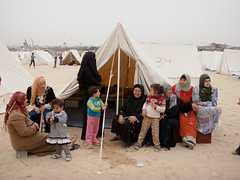I must have gotten this link over Facebook or Twitter, but I can’t recall to whom credit is due. At any rate, I found it interesting, especially because it looks at an aspect of the conflict that is not often discussed but might be one of the most critical in the long run: the experience of Palestinian children.
I grew up aware of the conflict in a very different way from my contemporaries on the Palestinian side. The Mondoweiss post discusses, with many excerpts, a new report criticizing aid organizations’ failure to prevent injustice towards children and to protest Israel’s violations of international law regarding children and their well-being.
Israel routinely treats children as enemies. I think Israel should actually make it part of its security policy to make sure Palestinian children are treated well and protected, because they will grow up to be Palestinians adults who we have a strong interest in not being intensely despised by. I happen to believe that Israel has done genuine grievance to the Palestinians and much of their hate (which is often of the non-compromising raging racist variety) is due to legitimate gripes with what our government (and some of its citizens) have done in the past 63 years. But it seems many in Israel think the Palestinians just hate us for no good reason, and cannot be appeased. Either way, we should be doing our best to show them that we are human and humane, like we keep telling ourselves and the rest of the world. Instead we make their lives a living hell and increasingly allow ourselves to only be represented towards them by our army.
Even if we think that Eden Abergil and her ilk are a marginal phenomenon (Google her if you missed the controversy)– and it can’t be entirely marginal, as Breaking the Silence and others subsequently released more pictures of soldier’s celebrating prisoners and dead opponents — we have an interest in doing our best to minimize animosity towards us. And I find it very difficult to accept that my government is systematically splitting up families, arresting children, interrogating them until they confess, and making it practically impossible for them to lead a normal, healthy childhood. I won’t even mention the number of children Israel apparently killed in “Operation Cast Lead”. Many in Israel may blame the Palestinians’ leaders for it coming to this, but that’s besides the point, as those children will certainly grow up to blame Israel, and that should be prevented, even at great cost and effort.
Like most Israelis, I grew up hearing about the horrors experienced by children in the Holocaust. I can’t help but feel the same despair when I think about how every day, Palestinian children experience things that remind one, even if just a little, of what my paternal grandmother and her contemporaries in Europe went through. And this feeling of despair is compounded by the fact that the perpetrators, this time, are supposed to be representing me and my family — and the families of so many whose childhoods were obliterated by monstrous state violence not so long ago.
The place of children in this conflict is one of the most horrifying aspects of it — on both sides, but especially in those areas where children regularly experience violence and great injustice (which is mostly where the civilians are Palestinians). Peace, and, even more, normalization, will not be possible with generations who have a ruined childhood to hate us for. It’s the kind of thing a person can hardly ever get over, even if they try. I hope Israel’s governments will soon realize this and stop making it impossible to ever end this conflict.



